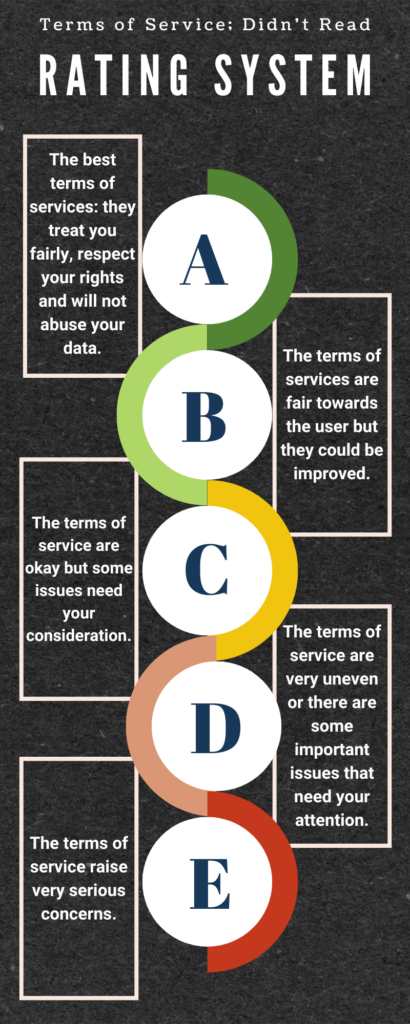Big Tech’s User Agreements are Even Worse than You Thought

Photo by Ales Nesetril on Unsplash
By JohnTaylor Wildfeuer
You must not be reading your user agreements either, because if you were you would have little time for anything else.
A 2008 Carnegie Mellon University study found that if American consumers read user agreements for websites they visit once per year it would require 76 full workdays, and the “national opportunity cost for just the time to read policies is on the order of $781 billion.”

Terms of Service; Didn’t Read aggregated data points on user agreement clauses, assigns those data points positive and negative values, and averages scores to come to this five tiered rating system. Data provided by Terms of Service; Didn’t Read. Infographic by JohnTaylor Wildfeuer.
Some of the longest and most onerous agreements signed, however, are with companies whose products are used almost constantly like Google, Facebook, Amazon, Apple, and Spotify. These barriers compound in concert, creating a collective bulwark against which pursuit of informed consent becomes an act of masochism.
Based on passwords saved to my two primary Google accounts I have apparently certified at least 222 times that I have read and agreed to the fine print of as many user agreements. Some represent services that are a part of my daily life and others based on a momentary – and often singular – need, never to be revisited.
Nevertheless, the extent to which I have used, and been used by, this coterie of online behavioral renditionists and their wares is no doubt stored somewhere to be integrated into prediction services by the renderer, or one of their third-party affiliates. Perhaps the fine print can be a map to their intentions, to my data rights.
Given the unwieldy data sample, I narrowed the scope to those 48 services on my list whose agreements have already been analyzed and rated by Terms of Service;Didn’t Read (ToS;DR), a non-profit and user funded, open data research forum intent on creating, “a transparent and peer-reviewed process to rate and analyse Terms of Service and Privacy Policies,” as attested on their website.
Of these 48, 18 received an E, the lowest possible rating. This group appears to be largely composed of those services whose user base has reached critical mass, and have escaped impactful critique by the masses.

48 of the 222 User Agreements researched had sufficient data points to be graded by Terms of Service; Didn’t Read. The majority of those listed received an E, which means their terms are restrictive, and may pose serious privacy concerns. Infographic by JohnTaylor Wildfeuer.
User Agreements with this demarcation share baseline commonalities like keeping user logs for undefined periods, collecting biometric data, and using personal data for targeted third-party advertising.
Reddit’s terms allow for private messages to be monitored at any time, and users waive “any claims and assertions of moral rights or attribution with respect to Your Content.”
Amazon’s includes a clause that allows for the terms of service to be changed at any time without notifying users, and requires consumers to waive their right to a class action lawsuit.
Youtube can view users browsing history, and stores deleted videos such that they are not truly deleted.
Disney+ stores data on even those account holders who do not use the service, and will track users even after they opt-out of tracking.
LinkedIn reserves the right to disseminate user identities through advertisements, reads users’ private messages, and like Disney+, collects account holder data regardless of whether their service is used.
In her brilliant exposé on Surveillance Capitalism, entitled the same, Shoshana Zuboff retraces the process by which our human wires have been intentionally crossed and trained to increase engagements which inform their behavior rendering algorithms.
“Our lives are scraped and sold,” Zuboff says, “to fund [surveillance capitalists’] freedom and our subjugation, their knowledge and our ignorance about what they know.”
In December 2016, Belgian data protection activist Paul-Olivier Dehaye requested a complete log from Facebook of his collected personal data. Fifteen months later he was told that elements of his data were baked into Facebook’s “Hive”, the platform’s “log storage data.”
Retrieving this information, he was told by the company, poses “huge technical challenges.” One can only assume the company intended to inspire confidence when adding “This data is also not used to directly serve the live Facebook website which users experience.”
Dehaye’s data will stay with Facebook, not to inform platform improvements, but to serve an undefined purpose for an indeterminate amount of time.
What little I now know about the fraction of agreements I have researched may have been accessible at any time, but it wasn’t approachable without consumer watchdogs like ToS;DR. Even then, though the revelations have better defined the staggeringly multitudinous privacy concerns, what follows is unclear.
Thoroughly reading one’s user agreements does not make them less oppressive, or provide opportunities for contract disputes. Removing oneself from the service does not guarantee a removal of oneself from their servers.
Perhaps the only path left for us is to unleash our watchdogs and work on our howl.









